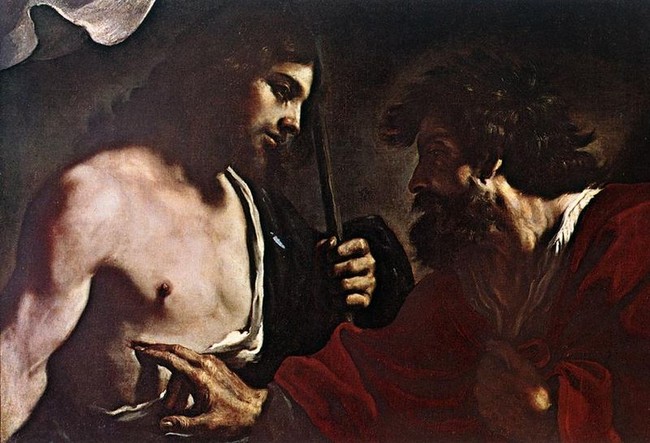
This morning’s Gospel reading is John 20:19–31:
On the evening of that first day of the week, when the doors were locked, where the disciples were, for fear of the Jews, Jesus came and stood in their midst and said to them, “Peace be with you.” When he had said this, he showed them his hands and his side. The disciples rejoiced when they saw the Lord. Jesus said to them again, “Peace be with you. As the Father has sent me, so I send you.” And when he had said this, he breathed on them and said to them, “Receive the Holy Spirit. Whose sins you forgive are forgiven them, and whose sins you retain are retained.”
Thomas, called Didymus, one of the Twelve, was not with them when Jesus came. So the other disciples said to him, “We have seen the Lord.” But he said to them, “Unless I see the mark of the nails in his hands and put my finger into the nailmarks and put my hand into his side, I will not believe.”
Now a week later his disciples were again inside and Thomas was with them. Jesus came, although the doors were locked, and stood in their midst and said, “Peace be with you.” Then he said to Thomas, “Put your finger here and see my hands, and bring your hand and put it into my side, and do not be unbelieving, but believe.” Thomas answered and said to him, “My Lord and my God!” Jesus said to him, “Have you come to believe because you have seen me? Blessed are those who have not seen and have believed.”
Now Jesus did many other signs in the presence of his disciples that are not written in this book. But these are written that you may come to believe that Jesus is the Christ, the Son of God, and that through this belief you may have life in his name.
Note: Since this is also Divine Mercy Sunday, I am rerunning my 2015 reflection. I hope you enjoy this reflection on its meaning. I have a number of other reflections on today’s readings linked below.
Today the Catholic Church and some Anglican communities celebrate Divine Mercy Sunday, instituted by St. John Paul II on the basis of the visions of St. Faustina Kowalska. The first occasion of the celebration took place in 2000, on the same day St. Faustina was canonized. One year later, St. John Paul II reminded celebrants at the second celebration that the feast of Divine Mercy emphasizes the message of Easter:
Jesus said to St. Faustina one day: “Humanity will never find peace until it turns with trust to Divine Mercy.” Divine Mercy! This is the Easter gift that the Church receives from the risen Christ and offers to humanity.
The Passion of Jesus Christ was the central event of divine mercy, of course. The only begotten Son of the Lord condescended to live as one of us, to instruct us on the fulfillment of the law of God. His fully human nature allowed Him to stand in place of all of us for the sacrifice which sin requires. The only barrier to this divine mercy of salvation is our lack of faith and trust in Him.
This brings us to our Gospel reading today, and the well-known tale of St. Thomas. Thomas stands in the place of all of us who rely on reason instead of faith, and the barrier that presents to His mercy. Thomas, in my opinion, tends to get a bad rap by becoming so associated with this as to be called Doubting Thomas throughout history. Who hasn’t doubted in their life of faith? Who hasn’t called out to God for a sign that He exists, and that He cares, like some toddler demanding candy from a parent to prove their love? We are all Doubting Thomases at one time or another.
Doubt and faith are not mutually exclusive states. We see this in the Gospel itself today, although it may be difficult to discern. Thomas refuses to take the word of his fellow disciples that the Master has arisen, and wants to be present before believing in it. Yet, Thomas is still present in the nascent church. It would have been far better for Thomas to have left Jerusalem by the time Jesus appears in Thomas’ presence, more than a week after the crucifixion. Both the Sanhedrin and the Romans wanted to lay hands on Jesus’ disciples, who were hiding out behind locked doors. Thomas may have doubted the Resurrection in the first few days, but he didn’t lose faith in Jesus’ teachings, or in his fellow disciples. He did not have a complete understanding of the Good News, nor trust that Jesus’ plan would triumph over evil, but neither did Thomas reject the church.
Most importantly, Jesus makes clear that doubt does not preclude faith. He gives a gentle rebuke to Thomas for abandoning trust in Him for Thomas’ own reason, but Jesus welcomes him into his belief at the same time. Do not be unbelieving but believe, Jesus says after condescending yet again to allow Thomas to use his reason to bolster his faith. Like those who have not seen and yet believed, Thomas is also blessed now for his belief, even if it took Jesus’ reappearance to realize it. Divine mercy can come to all of us, no matter the path we take to reach it, as long as we open our hearts to the saving grace of Jesus Christ.
John emphasizes the locked doors twice in this passage, and that also relates to the power of divine mercy. Obviously, the literal context of the passage relates to the hunted status of the disciples in those first few days of the church. The locked doors parallel Thomas’ state of faith as well as that of the disciples in the first appearance. Despite all that they have seen, they still struggle with faith that Christ will see them through their mission. Jesus has to come through a locked door to get to them, to bolster and rally them from despair and fright. For Thomas, Jesus does so twice, just to make sure that He has lost none of his flock.
Divine mercy unlocks our hearts to salvation. Every conversion story, every deepening of faith begins with the love of God touching our hearts — the junction between the intellect and the will — in some fashion, bolstering our trust in Jesus and salvation. Divine mercy not only unlocks our hearts, but challenges us to keep them unlocked, not just for the Holy Spirit within ourselves but also for the Holy Spirit in others as well. “In this way,” John writes in his first epistle (today’s second reading), “we know that we love the children of God when we love God and obey his commandments.”
Writing Acts 4:32-35, Luke gives us a picture of the early church as they lived a life enlightened by the knowledge of the divine mercy they had received from Christ’s sacrifice.
The community of believers was of one heart and mind, and no one claimed that any of his possessions was his own, but they had everything in common. With great power the apostles bore witness to the resurrection of the Lord Jesus, and great favor was accorded them all. There was no needy person among them, for those who owned property or houses would sell them, bring the proceeds of the sale, and put them at the feet of the apostles, and they were distributed to each according to need.
This passage too often gets interpreted in many ways for many purposes, but the key here is that all of this was freely done. The apostles did not impose a requirement for this as a form of dues in order to hear the Good News or to take part in the church. People who felt touched by the Holy Spirit did this in joy, to parallel in some small way the great and divine mercy that had been poured out on them. They saw brothers and sisters in need, and demonstrated the kind of caritas love that lived in their own hearts. The “one heart and one mind” was formed in faith and trust in Jesus Christ, forged in the divine mercy of the Passion.
The challenge for us on Divine Mercy Sunday, therefore, is twofold. First, we have to recognize and believe in the infinite mercy of Christ and embrace our part in it. We must also then ask the Holy Spirit what our role is in seeing it in others and opening the hearts of our brothers and sisters to it. In that way, we can unlock the doors of salvation to all who yearn for it.
Previous reflections on these readings:
The front page image is “The Incredulity of Thomas” or “Doubting Thomas” by Guercino, 1621. On display at the Residenzgalerie Salzburg, Austria. Via Wikimedia Commons.
“Sunday Reflection” is a regular feature that looks at the specific readings used in today’s Mass in Catholic parishes around the world. The reflection represents only my own point of view, intended to help prepare myself for the Lord’s day and perhaps spark a meaningful discussion. Previous Sunday Reflections from the main page can be found here.







